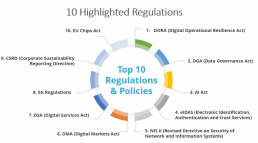Proactive Approach to Monitoring and Responding to Digital Regulations
In a fast-moving business environment, having actionable information about the external drivers shaping economies in both the short and long term is key to success. New regulations and major policy changes can shake up markets and hurt businesses, while informed and resilient organizations will ride those waves and seize opportunities to become more competitive.
There was a compliance rush when General Data Protection Regulation (GDPR) entered in effect in 2018, with companies looking for last-minute guidance and quick solutions to comply and avoid hefty fines and other legal actions. Unfortunately, most organizations adopted this reactive approach. But others attended to the new requirements in advance — in particular, some tech vendors created new products and services to address this new market created by GDPR.
Since then, the digital economy has become even bigger — according to the World Bank (2022), the digital economy represents 15% of the global economy. Consequently, there has been a proliferation of digital regulations and policies worldwide, with more than 100 countries mirroring GDPR.
And in the EU, dozens of new regulations have been created to address ever-more relevant digital markets. Beyond mapping more than 30 EMEA new or updated regulations, IDC’s EMEA Digital Regulations and Policies Radar examines 10 of the most relevant regulations and policies in EMEA and analyzes their impact on European ICT markets.
10 Key European Digital Regulation & Compliance Developments
- DORA
The Digital Operational Resilience Act addresses the concerns of a possible systemic risk stemming from the prominent role of critical ICT service providers in the financial industry
- DGA
The Data Governance Act is expected to make more data available and facilitate data sharing across sectors and EU countries
- AI ACT
The EU Artificial Intelligence Act is a legal framework proposed in response to ethical challenges presented by AI
- eIDAS
The EU Electronic Identification Authentication and Signatures Regulation created a Europe-wide legal framework for electronic identification, transactions, and signatures
- NIS II
The EU Directive on Security of Network and Information Systems Directive II requires Member States to have in place resilient and effective national cybersecurity regimes.
- DMA
The Digital Markets Act is the EU’s legislation to make the digital sector fairer and contestable, it establishes new rules to limit the market power of big online platforms
- DSA
The Digital Services Act (DSA) is meant to protect the fundamental rights of EU-based users of digital services and create new opportunities for digital-first businesses
- 5G Regulations
All regulations related to 5G network capacity and spectrum allocation
- CSRD
The European Commission Corporate Sustainability Reporting Directive mandates large organizations in Europe to report on sustainability standards
- EU Chips Act
The “EU Chips Act” is a competition policy aimed at bolstering the regional internal production of semiconductors
The European digital regulatory landscape has unique characteristics that must be addressed for a proactive digital regulatory strategy. The many acronyms and complex scenarios derived from the many acts, directives, and policies from the EU can be daunting at first sight, but to future proof your organization, we recommend three actions to proactively approach your digital regulatory strategy:
- Monitor closely the regulatory landscape to anticipate current and future challenges
- Link your go-to-market strategy and product development (e.g., adding new features and controls) to upcoming regulatory requirements
- Work with the tech vendor ecosystem to buy or develop the right technologies to achieve short-term compliance efficiency (via automated compliance software from RegTechs)
Please contact us if you’d like to know more about this research stream, especially if you are a tech vendor interested in developing solutions in the RegTech market or a tech vendor that can be directly impacted by new digital standards in the European market. You can access our new subscription product, featuring European regulations and policies, here European Digital Regulations and Policies Radar (idc.com) or contact Anielle Guedes at anguedes@idc.com.


